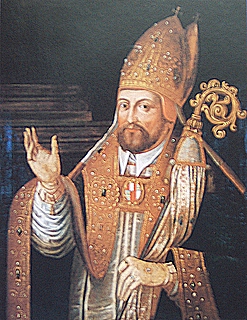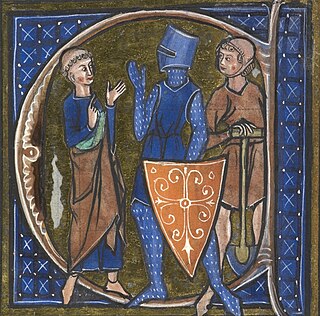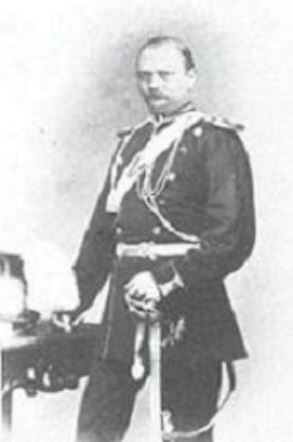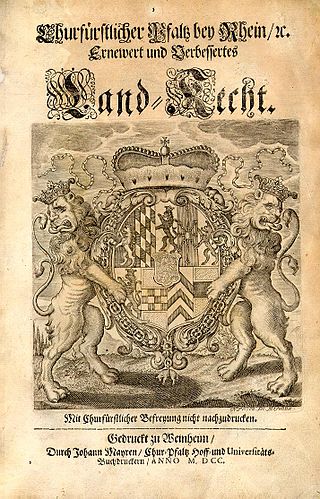
Arbeit macht frei ( ) is a German phrase translated as "Work makes one free" or more idiomatically "Work sets you free" or "work liberates".

Feudalism, also known as the feudal system, was a combination of legal, economic, military, cultural, and political customs that flourished in medieval Europe from the 9th to 15th centuries. Broadly defined, it was a way of structuring society around relationships derived from the holding of land in exchange for service or labour.

Manorialism, also known as seigneurialism, the manor system or manorial system, was the method of land ownership in parts of Europe, notably France and later England, during the Middle Ages. Its defining features included a large, sometimes fortified manor house in which the lord of the manor and his dependants lived and administered a rural estate, and a population of labourers or serfs who worked the surrounding land to support themselves and the lord. These labourers fulfilled their obligations with labour time or in-kind produce at first, and later by cash payment as commercial activity increased. Manorialism was part of the feudal system.

Magna Carta Libertatum, commonly called Magna Carta or sometimes Magna Charta, is a royal charter of rights agreed to by King John of England at Runnymede, near Windsor, on 15 June 1215. First drafted by the Archbishop of Canterbury, Cardinal Stephen Langton, to make peace between the unpopular king and a group of rebel barons, it promised the protection of church rights, protection for the barons from illegal imprisonment, access to swift and impartial justice, and limitations on feudal payments to the Crown, to be implemented through a council of 25 barons. As neither side stood by their commitments, the charter was annulled by Pope Innocent III, leading to the First Barons' War.

The Bill of Rights 1689 is an Act of the Parliament of England that set out certain basic civil rights and changed the succession to the English Crown. It remains a crucial statute in English constitutional law.

A prince-bishop is a bishop who is also the civil ruler of some secular principality and sovereignty, as opposed to Prince of the Church itself, a title associated with cardinals. Since 1951, the sole extant prince-bishop has been the Bishop of Urgell, Catalonia, who has remained ex officio one of two co-princes of Andorra, along with the French president.

Serfdom was the status of many peasants under feudalism, specifically relating to manorialism, and similar systems. It was a condition of debt bondage and indentured servitude with similarities to and differences from slavery. It developed during late antiquity and the Early Middle Ages in Europe and lasted in some countries until the mid-19th century.

The estates of the realm, or three estates, were the broad orders of social hierarchy used in Christendom from the Middle Ages to early modern Europe. Different systems for dividing society members into estates developed and evolved over time.

Corvée is a form of unpaid forced labour that is intermittent in nature, lasting for limited periods of time, typically only a certain number of days' work each year. Statute labour is a corvée imposed by a state for the purposes of public works. As such it represents a form of levy (taxation). Unlike other forms of levy, such as a tithe, a corvée does not require the population to have land, crops or cash.

Patricianship, the quality of belonging to a patriciate, began in the ancient world, where cities such as Ancient Rome had a social class of patrician families, whose members were initially the only people allowed to exercise many political functions. In the rise of European towns in the 12th and 13th centuries, the patriciate, a limited group of families with a special constitutional position, in Henri Pirenne's view, was the motive force. In 19th century Central Europe, the term had become synonymous with the upper Bourgeoisie and cannot be interchanged with the medieval patriciate in Central Europe. In the maritime republics of the Italian Peninsula as well as in German-speaking parts of Europe, the patricians were as a matter of fact the ruling body of the medieval town. Particularly in Italy, they were part of the nobility.
The term Stift is derived from the verb stiften and originally meant 'a donation'. Such donations usually comprised earning assets, originally landed estates with serfs defraying dues or with vassal tenants of noble rank providing military services and forwarding dues collected from serfs. In modern times the earning assets could also be financial assets donated to form a fund to maintain an endowment, especially a charitable foundation. When landed estates, donated as a Stift to maintain the college of a monastery, the chapter of a collegiate church or the cathedral chapter of a diocese, formed a territory enjoying the status of an imperial state within the Holy Roman Empire then the term Stift often also denotes the territory itself. In order to specify this territorial meaning the term Stift is then composed with hoch as the compound Hochstift, denoting a prince-bishopric, or Erzstift for a prince-archbishopric.

The Sachsenspiegel is one of the most important law books and custumals compiled during the Holy Roman Empire. Originating between 1220 and 1235 as a record of existing local traditional customary laws and rulings, it was used in places until as late as 1900. Some legal principles as captured in the book reign into recent time laws throughout Europe. It is important not only for its lasting effect on later German and Dutch law but also as an early example of written prose in a Low German language. The Sachsenspiegel is the first comprehensive law book not in Latin, but in Middle Low German. A Latin edition is known to have existed, but only fragmented chapters remain.
In the law of the Middle Ages and early modern period, especially within the Holy Roman Empire, an allod, also allodial land or allodium, is an estate in land over which the allodial landowner (allodiary) had full ownership and right of alienation.

Old French law, referred to in French as l'Ancien Droit, was the law of the Kingdom of France until the French Revolution. In the north of France were the Pays de coutumes, where customary laws were in force, while in the south were the Pays de droit écrit, where Roman law had been paramount. Roughly speaking, the line separating the two areas was the river Loire, from Geneva to the mouth of the Charente, although this was not a firm border between the two categories of law. As worded by George Mousourakis, "in both zones, the law in force also included elements derived from royal, feudal, and canonical sources."

The Frisian freedom was a period of the absence of feudalism in Frisia during the Middle Ages. Its main aspects included freedom from serfdom, feudal duties and taxation, as well as the election of judges and adjudicators.

A villein is a class of serf tied to the land under the feudal system. As part of the contract with the lord of the manor, they were expected to spend some of their time working on the lord's fields in return for land. Villeins existed under a number of legal restrictions that differentiated them from freemen, and could not leave without his lord's permission. Generally, villeins held their status not by birth but by the land they held, and it was also possible for them to gain manumission from their lords. The villeinage system largely died out in England in 1500, with some forms of villeinage being in use in France until 1789.
The history of English land law can be traced back to Roman times. Throughout the Early Middle Ages, where England came under rule of post-Roman chieftains and Anglo-Saxon monarchs, land was the dominant source of personal wealth. English land law transformed further from the Anglo-Saxon days, particularly during the post-Norman Invasion feudal encastellation and the Industrial Revolution. As the political power of the landed aristocracy diminished and modern legislation increasingly made land a social form of wealth, subject to extensive social regulation such as for housing, national parks and agriculture.

Grand Burgher [male] or Grand Burgheress [female] is a specific conferred or inherited title of medieval German origin and legally defined preeminent status granting exclusive constitutional privileges and legal rights. Grand Burghers were magnates and subordinate only to the Emperor, independent of feudalism and territorial nobility or lords paramount.

The Landrecht was the law applying within an individual state in the Holy Roman Empire during the Middle Ages and Early Modern times. The state laws that emerged in the territories of the empire from the 12th century onwards had been developed from the older tribal laws of the Saxons, Swabians, Bavarians and Bohemians. Through privileges and laws passed by the territorial princes as well as the jurisprudence of the Landgerichte or state courts, these ancient rights were supplemented and developed. Later Roman law was also accepted and incorporated into the Landrechte. The Landrecht was only applied to the burghers of a town in a secondary way, because they came primarily under municipal law and the autonomous jurisdiction of their communities.
Serfdom has a long history that dates to ancient times.














